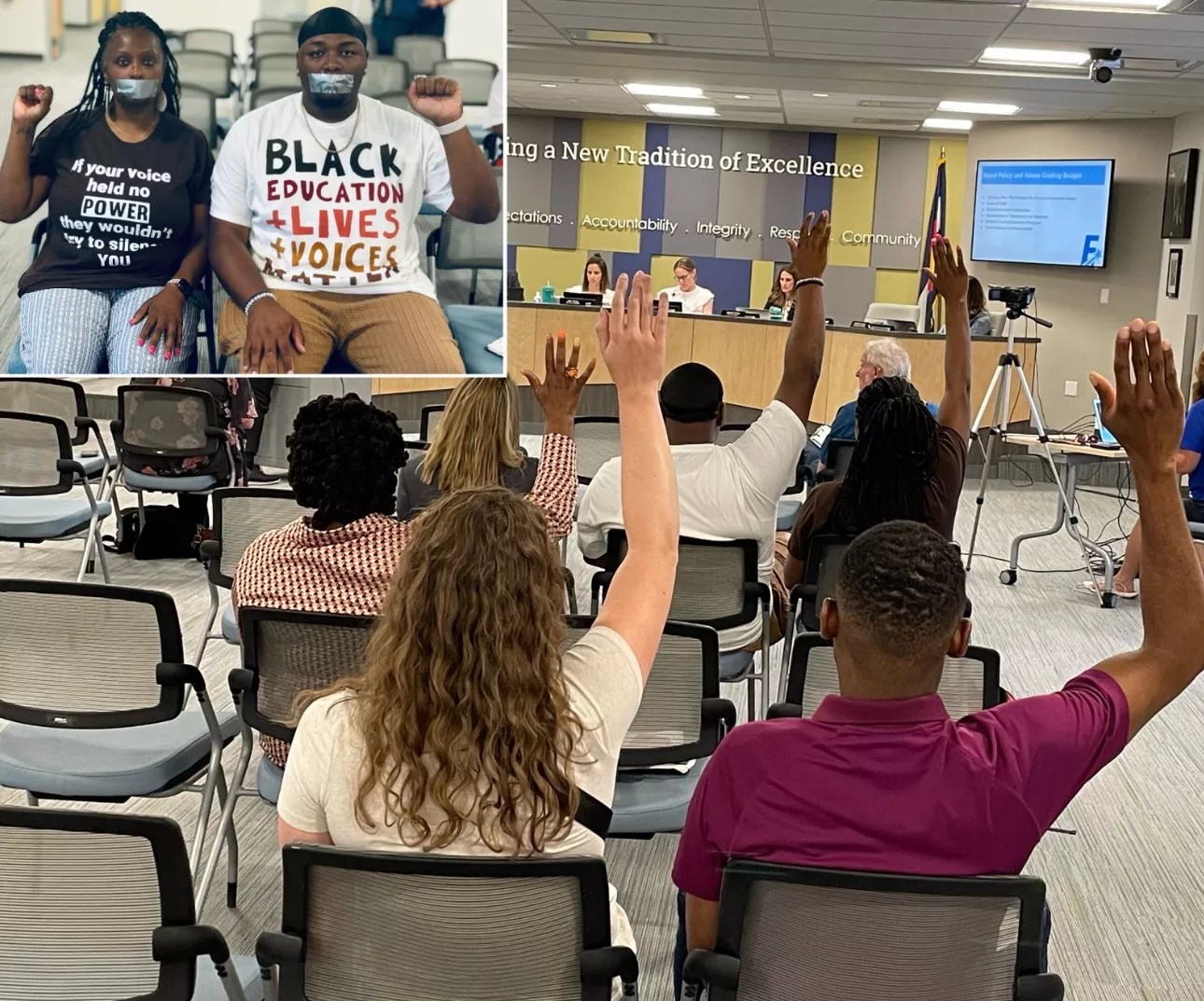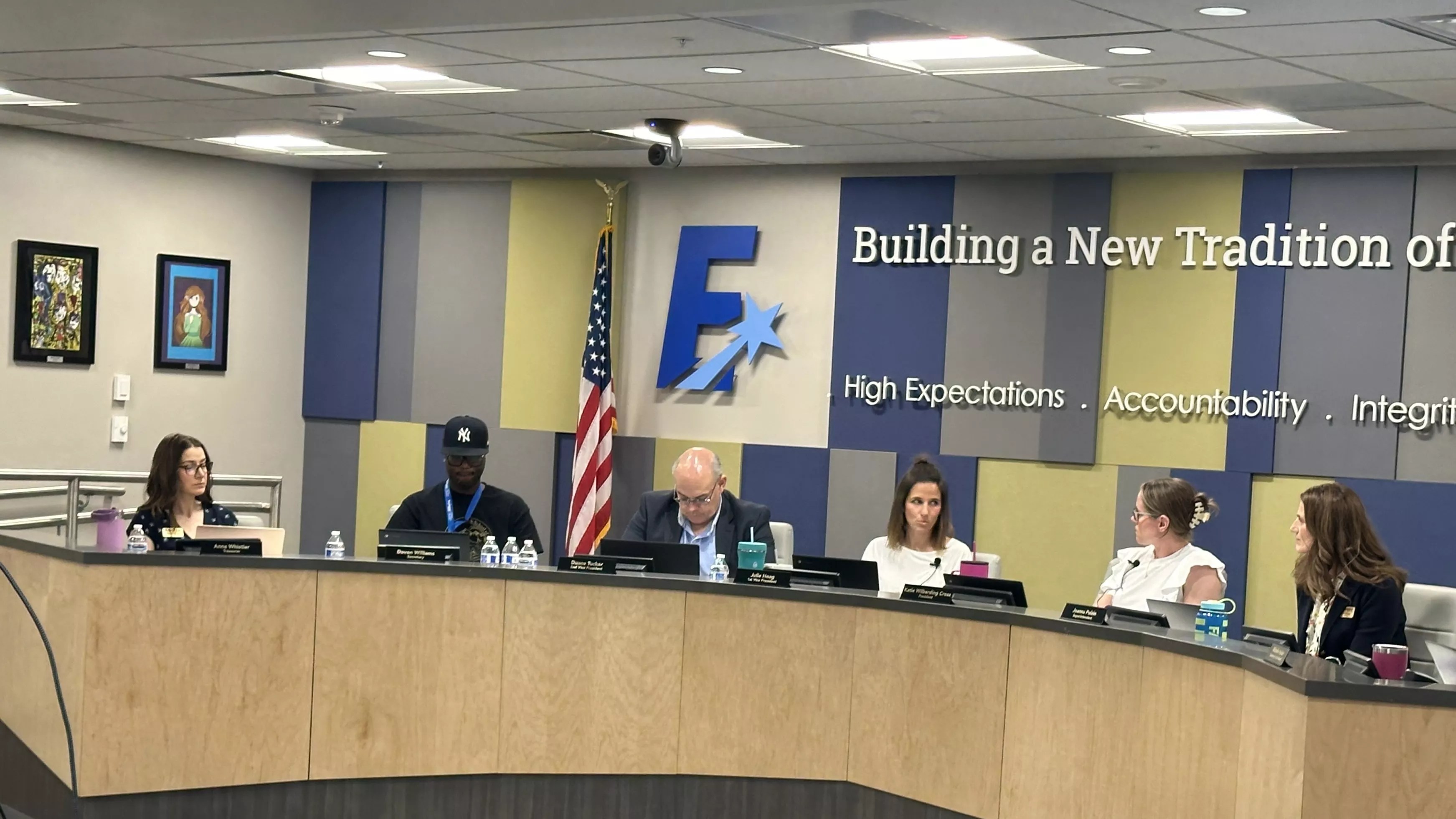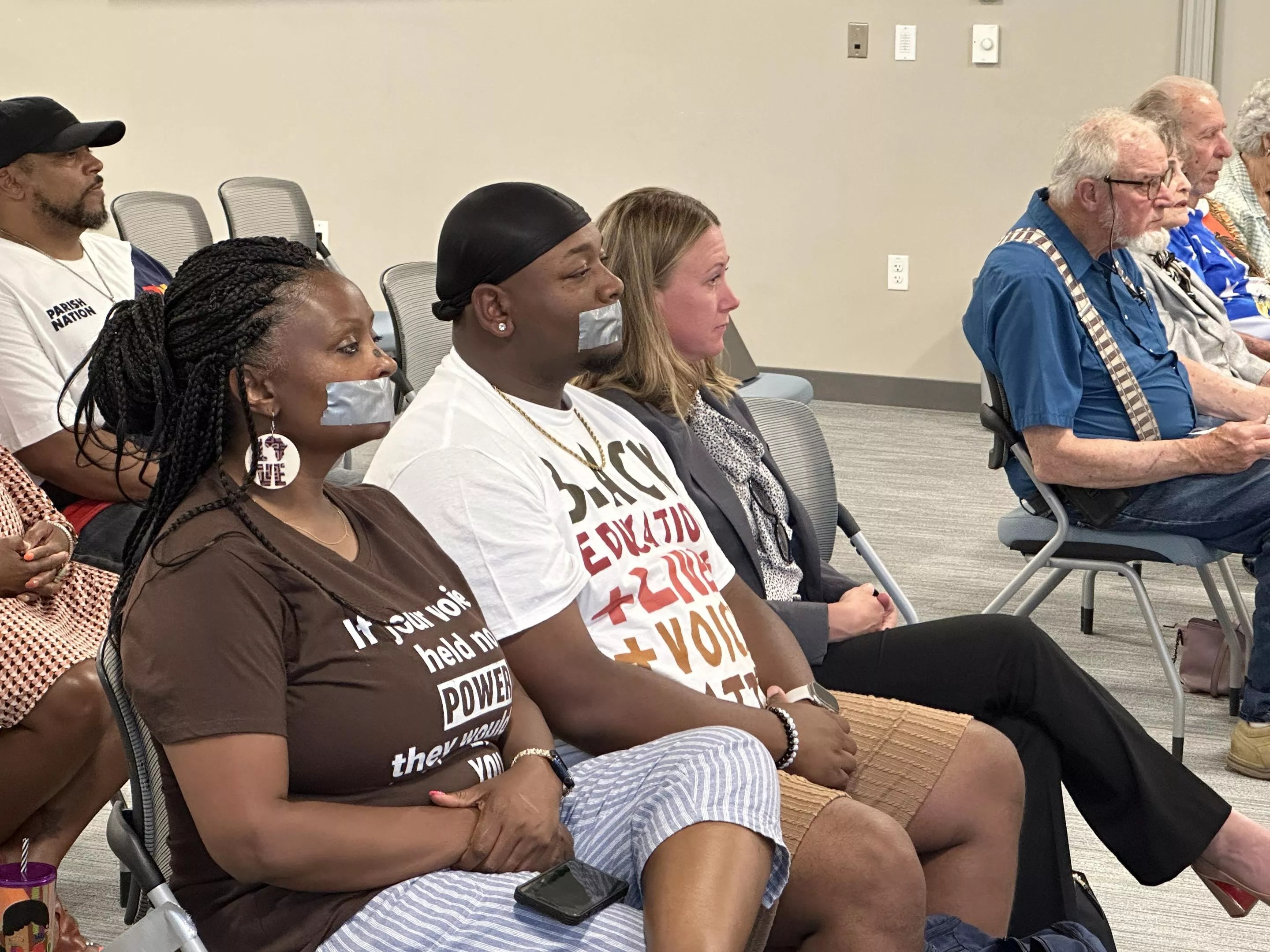
Westword

Audio By Carbonatix
Should a school board be allowed to block members of the public – specifically, people who don’t live in the school district – from speaking at board meetings?
It’s a question causing all sorts of drama in Englewood Schools right now, with Black activists attending a Board of Education meeting on Tuesday, June 4, with their mouths taped shut and hands raised in protest of the policy change that’s prompted it.
Auon’tai Anderson, CEO of the Center for Advancing Black Excellence in Education and former Denver School Board vice president, and MiDian Holmes, CEO of the Epitome of Black Excellence & Partnership, showed up to the evening meeting after being denied requests to speak this week, and were joined by a trio of residents during the public protest.
The group was small, but their actions spoke loudly, as only a few other people showed up to the meeting for unrelated business. The protesters raised their hands after the public comment session and kept them raised for several minutes to note how they had been silenced.
“We were wanting to speak, and that opportunity was not given,” Lea Steed, an Aurora resident and parent who recently heard about Englewood’s policy change, said after the meeting. “While I’m not a parent here, the shutting down and silencing of public comment…is insidious.”
Englewood’s Board of Education voted unanimously last month to change its public comment policy to bar people without direct ties to the district – such as Anderson, Holmes and Steed – from speaking during public comment sessions without an invitation or approval from the board president or superintendent. The move came at the end of a meeting where Anderson and Holmes spoke out against the board for its treatment of Davon Williams, the only Black member.

The Englewood Board of Education has only one non-white boardmember, despite having a student population that’s half BIPOC.
Westword
Williams, a two-time convicted felon currently facing an auto theft charge from 2019, has been a subject of controversy for months in Englewood after running unopposed last November. He was denied a mileage reimbursement by his fellow boardmembers in March, with the decision blasted by Anderson and Holmes as racially motivated.
Last month, the two launched the “Green Book Initiative” to rate schools, districts and boards on their behavior toward Black students and staff. The initiative opened with an “Exodus” score for Englewood’s board, the program’s worst possible rating, though boardmembers questioned the initiative’s scoring methods.
Anderson and Holmes presented the findings at a May 7 board meeting, which ended with the public comment vote. Williams and the rest of the board approved it unanimously.
Williams told Westword last month that he voted in favor of the policy change because there are some aspects to it that he “stood by” and still stands by, such as the reduced time limit for speakers. However, he said the reimbursement dispute made him feel “isolated” and that it’s been hard to communicate as the district’s sole Black boardmember.
“Because I’m a member of the [Colorado Black Caucus of School Board Directors], I frequently interact with other Black elected officials in similar positions, which is how I’m able to effectively do my job,” Williams said. “There’s some times, being a new member, that I don’t necessarily feel comfortable going to other boardmembers and asking them questions that I feel more comfortable asking my caucus.”
After the board vote and policy change, a coalition of Black leaders and advocates from across the state – including Brother Jeff Fard, Dr. Ryan Ross with the Urban Leadership Foundation of Colorado, and former Aurora Public Schools Board of Education member Dr. Eric Nelson – spoke out against Englewood Schools and the board in a joint statement sent to the district. Williams said the reaction resonated with him.
“In my opinion, it shows me that maybe we do have work to do in the community engagement department to engage voices that may be watching and listening,” he told Westword.
Residents, property owners, parents, students and staff are now the only ones permitted to speak publicly at Englewood education board meetings, according to the new policy.
“We feel ignored,” Holmes tells Westword after the meeting.
She and Anderson submitted requests to comment at Tuesday’s board meeting, as required now by the policy change, but both were denied on June 3 for the same listed reason.
“Based on the information you provided with your public comment submission, you do not meet the eligibility criteria of Policy BEDH,” the denial letters read. “Therefore, your request to make public comment at the next scheduled meeting of the Board of Education is denied.”
In response, Anderson and Holmes sent out a press release on Tuesday morning announcing that they were looking to file a “First Amendment lawsuit” against Englewood Schools and had retained former Denver district attorney candidate Lisi Owen for representation. Owen was in attendance Tuesday night at the board meeting.

Auon’tai Anderson (middle) and MiDian Holmes (left) both showed up at the Englewood meeting on Tuesday night with attorney Lisi Owen (right).
Westword
While Anderson and Holmes were not allowed to speak, Englewood’s superintendent, Joanna Polzin, chose to address the lawsuit the activists threatened to file, opening her “Superintendent’s Report” with a statement about the possible litigation against the board.
“The district was not aware of the press release that was issued today until a news outlet had forwarded it to [the board],” Polzin said. “Please know that the district has not received any notice of a lawsuit filed by individuals or their companies. And know that we cannot comment on threatened or pending litigation. So I would just like to make sure I reiterate that.”
Holmes calls the statement a “direct stab at our presence in the room,” and believes it was unfair that Polzin was allowed to address the censorship backlash publicly, while she and Anderson couldn’t respond.
“Although they didn’t allow us the opportunity to engage in the public process and the democratic process, I feel like they were essentially taking stabs,” Holmes says. “I didn’t feel it was necessary to bring that up if there was no reason or chance for there to be comment.”
Holmes notes how several times throughout the meeting, boardmembers made it a point to show how the district and themselves were grounded in core values such as “student impact” and equity. They repeatedly noted how Englewood students and families are their top priority, and that as boardmembers, they are looking at how their actions impact students, families and staff.
Holmes calls it “a performance” – and a good one at that.
“They were performing,” she says. “They were in rhythm. They were really trying to put on a show. It’s just really disgusting and disheartening.”
Speaking to Westword last month, Polzin insisted that Englewood Schools had simply changed its public comment policy to match what other districts – like the Cherry Creek School District – were doing. She said that while the timing of the vote looks bad, it had been in the board’s “queue” for a while, and Englewood even consulted with the Colorado Association of School Boards before moving forward with the update.
“Many other districts have similar language in their policy that encourages ensuring that there’s a nexus to the district when folks are coming in and engaging in public comments,” Polzin explained. “That is why it was a 5-0 unanimous vote regarding the updated language.”

Boardmember Davon Williams has been a subject of controversy since running unopposed last year.
Englewood Board of Education
Polzin told Westword that Englewood Schools was “open to external voices” speaking at meetings, but it wants to ensure that those voices are going to “co-create positive change for our students and our community.” People attending Tuesday night’s meeting in support of Williams, Anderson and Holmes called it an attack on the First Amendment.
“You are a state government body, it’s an open meeting law, and you’re conducting a public meeting – and everybody has the right to be there,” blasted Gary Kozacek, Williams’s partner and an esteemed local football coach, during the board’s public comment session.
“If you don’t allow outside residents to come in, then your state funding should be taken away and you will have points against you as far as qualifying for grants,” Kozacek said. “Who’s that going to cost? Me, the taxpayer. Us, the Englewood School District. So you really need to reconsider what you have set up with that.”
Anderson says that while litigation has been threatened, he and Holmes haven’t moved forward with a lawsuit yet. They want to give Englewood boardmembers more time to weigh their options.
“We’re still deliberating on what to do, and when,” Anderson tells Westword. “We don’t want to weaponize the legal system. However, this is an issue that is not secluded to one school district. Englewood is just the most recent and reactive. We want to take this opportunity to see how this could impact other public comment policies. Because once a court sets precedent, this could grow into something much bigger.”